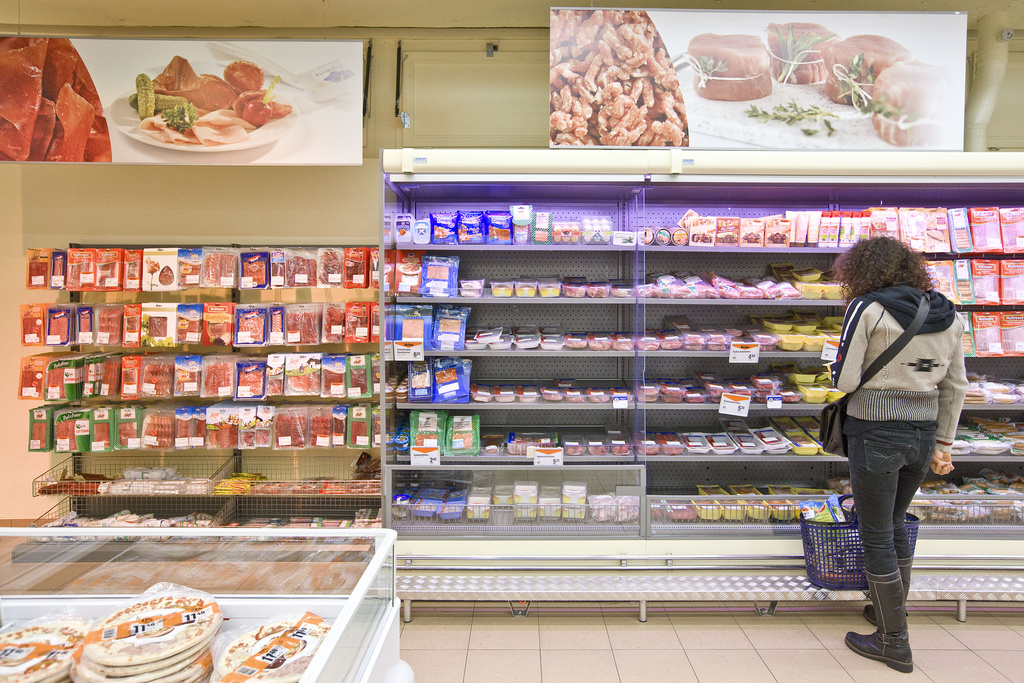High street prices unaffected by weak euro

Consumers are being shortchanged by the failure of traders to pass on the reduced price of European imports to the high street, watchdogs are complaining.
Research has shown that Swiss shoppers still have to pay substantially more than European counterparts despite the euro losing ground to the franc for several months. Traders have blamed this on the rising cost of raw materials.
Switzerland has traditionally been known as a high price island for consumers thanks to a higher earning potential than neighbouring countries and the relatively underdeveloped competition in the domestic market.
But the consumer protection association is running out of patience with shoppers having to pay some 20-30 per cent more for the same goods as those in other European countries.
The watchdog is demanding that the price charged for European imported goods should be lowered by at least eight per cent to reflect the effects of currency exchange rates. Around four-fifths of all imports come to Switzerland from the European Union.
Comprehensive figures of Swiss prices in relation to other countries are only available up to 2008, but the association’s own survey of a range of products revealed no change in the high price island mentality.
Trade restrictions lifted
“International suppliers see that the Swiss have more spending power so they put up the price of their goods,” consumer protection association business leader Sara Stalder told swissinfo.ch. “The euro has been weak against the franc [hovering around the SFr1.40 mark] for some time, but this has not been reflected in the market.”
Many retailers point out that the price of raw materials for many goods has been rising since the start of the year, making it more expensive to produce them.
Switzerland’s largest supermarket chain, Migros, argues that prices are starting to fall thanks to increased competition from German discounters and the dismantling of certain trade barriers between Switzerland and the EU.
Last year, the Swiss government lifted the ban on parallel imports, opening the door for Swiss branded goods to be manufactured or bought abroad at cheaper prices and then to be returned to the Swiss market at reduced prices.
Next month, Switzerland will adopt the EU Cassis de Dijon trade rule that will allow cheaper European goods to move more freely over Swiss borders.
Contracts not in euros
However, consumers should not expect to benefit so easily from the effects of the strong franc and the weak euro, according to Migros spokeswoman Monika Weibel. “We import fruit, vegetables and some other food products from Europe, but a lot of our goods come from outside the EU,” she told swissinfo.ch.
“And a lot of our contracts with suppliers are made in Swiss francs or dollars that last for the course of a year,” she added.
Swiss price watchdog supervisor Stefan Meierhans said there is evidence that multinational retail chains are reducing the price of goods in shops just inside the Swiss border after witnessing Swiss shoppers crossing over to their stores in other countries to take advantage of the weak euro.
Meierhans believes the relaxation of trade barriers between Switzerland and the EU should bring benefits to consumers. But he is worried that a lack of domestic competition in some sectors is still inflating prices.
For example, Swiss customers pay significantly more for mobile telephone services than Austrian counterparts because there are fewer rival operators in Switzerland. “There are still signs that market competition does not work 100 per cent in all areas,” he told swissinfo.ch.
Proposed VAT changes
Another factor that would affect consumer prices is the proposed changes to value added tax (VAT) rules being proposed by Finance Minister Hans Rudolf Merz. VAT is currently set up in three bands with a plethora of exemptions.
Merz wants to simplify the tax by introducing a flat 6.2 per cent rate – still below that of many European countries. However, the proposal has met with mounting political criticism as some items – such as food that is currently taxed at a rate of 2.4 per cent – would end up with a higher burden.
The changes would have to negotiate stiff opposition and would in any case take some time to implement. The consumer protection association is one group that would not like to see such changes.
“This would have a negative effect for consumers as the many sensible exceptions would be removed and the price of groceries would rise,” said Sara Stalder.
Swiss consumers are well used to paying 20-30% more for the same goods as European neighbours.
The high standard of living with superior wages enjoyed by the Swiss combined with a relatively closed domestic market have been blamed for this disparity.
However, some steps have been taken in recent years to stimulate competition and reduce prices for Swiss consumers. These include the partial lifting of a ban on parallel imports and the pending introduction of the Cassis de Dijon principle.
It was hoped that the emergence of German discount supermarkets in Switzerland would also drive prices down.
However, research from the NZZ am Sonntag newspaper showed that price discrepancies still remain.
Swiss consumers must still pay between 34% and 53% more for selected clothing items and around a quarter more for household electronic equipment, the research uncovered.
Cars are also more expensive, to the tune of 19% extra for a BMW 320i, 26% for a Lancia Delta and a 47% premium for a Fiat 500 series car.
Other high price offenders were a barbecue grill that costs 55% more in Switzerland than in the EU and even some holiday offers were considerably higher.

In compliance with the JTI standards
More: SWI swissinfo.ch certified by the Journalism Trust Initiative












You can find an overview of ongoing debates with our journalists here . Please join us!
If you want to start a conversation about a topic raised in this article or want to report factual errors, email us at english@swissinfo.ch.